| Sunday, April 6, 2003 |  |
|
|
|
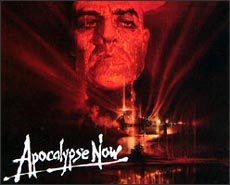 BBC about George W. Bush and his conviction that God wants him to engage the forces of evil. BBC about George W. Bush and his conviction that God wants him to engage the forces of evil. He had turned to God at the age of 40 as a way of kicking alcoholism, and his faith had kept him on the straight and narrow ever since, giving him the drive to reach the White House.
But all that changed on the day of the attacks on the Pentagon and World Trade Center.Those close to Mr Bush say that day he discovered his life's mission.
He became convinced that God was calling him to engage the forces of evil in battle, and this one time baseball-team owner from Texas did not shrink from the task. Pretty freaky, really, if Bush really thinks he's now battling the anti-Christ. And nearly all mainland churches in the U.S. are uncomfortable with that as well, and are opposing the war.
I'm not particularly religious, but if I were adhering to the idea of a Christian God (or Jewish or Islamic), I'd be very uncomfortable with the idea that a U.S. president thinks that this God reports to him. That's not what he says in words, but that is the structure of what he says. That God is on his side in the war, and that God will back up his decisions. That does sound like some kind of blasphemy to me. No other U.S. president have had any such hubris in the past.
For that matter, if it wasn't so tragic and dangerous, it would be sort of funny. The fate of the world is in the hands of an illiterate alcoholic delusional coke-head, who hears voices in his head about how he's chosen for a special mission, and who pays little attention to what is going on in the real world. What makes it dangerous is that a sufficiently large percentage of the American population believe in the same comic book vision.
[ Politics | 2003-04-06 22:57 | | PermaLink ] More >
|
|
| Friday, April 4, 2003 |  |
|
|
|
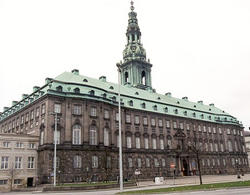 One thing I appreciate about how Denmark is run, which I didn't see the same way when I lived there, is that people who are in the position to decide big things will talk it over, seemingly endlessly. Well, that's what it used to look like to me. The news is filled with politicians talking and talking; people speaking for many different sides; nobody apparently committed to much of anything. That is drastically different from the U.S. where the news is filled first of all with disasters, and secondly with politicians who seem very sure about everything, but who only seem to have the opinions they're being paid for having by their corporate handlers. And nobody actually *talks* things over. It is more about getting your side to win, through force, persuasion, lies, money, diversion, or whatever it takes. One thing I appreciate about how Denmark is run, which I didn't see the same way when I lived there, is that people who are in the position to decide big things will talk it over, seemingly endlessly. Well, that's what it used to look like to me. The news is filled with politicians talking and talking; people speaking for many different sides; nobody apparently committed to much of anything. That is drastically different from the U.S. where the news is filled first of all with disasters, and secondly with politicians who seem very sure about everything, but who only seem to have the opinions they're being paid for having by their corporate handlers. And nobody actually *talks* things over. It is more about getting your side to win, through force, persuasion, lies, money, diversion, or whatever it takes.
In Denmark, the politicians actually seem to be there to talk things through, so that the right decisions can be made. And even though everybody still hates most of them, and even though it takes a while to get anywhere, it is quite real. Working things through with everybody who has a stake is a shared value. Most politicians will be very non-committal, and will refer to that things have to be talked through before they can state anything with certainty. And what I realize now is that this is a good thing. A commitment to dialogue and consensus and openness. Most Danes will probably not agree or recognize this, and will probably tell me that the politicians really are a bunch of crooks, and that nothing gets done, and everything is really bad. But, seeing it from the outside, and only visiting once in a while, things are not too bad in Denmark. It is a wealthy country that takes good care of its people. People are friendly, and everything works. It all looks better than it did when I moved from there 18 years ago. Something is working.
Thomas Madsen Mygdal predicts that the next Danish prime minister will have a weblog. He might very well be right. Whereas it wouldn't work for the current style of politicians in the U.S., it would work well for most Danish politicians.
As a matter of fact, the prior Danish prime minister, Poul Nyrup Rasmussen, now has a weblog. It is in Danish, so chances are you can't read it. But it is real. He talks about what he does every day and what he feels about it. That is a real big thing, for a politician to be open like that. And I hope the world sees more of that.
[ Politics | 2003-04-04 12:16 | 0 comments | PermaLink ]
|
|
| Thursday, March 20, 2003 |  |
|
|
|
Ramzi Kysia is living in Baghdad right now by choice, to bear witness to the war."My country may arrest me as a traitor, or kill me during saturation bombing, or shoot me during an invasion. The Iraqis may arrest me as a spy, or cause or use my death for propaganda. Civil unrest and mob violence may claim me. I may be maimed. I may be killed.
I am nervous. I am scared. I am hopeful. I am joyous, and I joyously delight in the wonder that is my life.
I love being alive. I love the splendor of our world, the beauty of our bodies, and the miracle of our minds. I bless the world for making me, and I bless the world for taking me. I feed myself on the fellowship we inspirit, in standing one with another in this, this present moment, each moment unfolding to its own best time.
Different things move different members of our team, but all of us are here out of deep concern for the suffering of our brothers and sisters in Iraq. 20 years of almost constant war, and 12 years of brutal sanctions, have killed hundreds of thousands of innocents in Iraq.
We are here, today, because most of the world refused to be present, then. What more right do I as an American have to leave then all the people I've come to love in Iraq? An accident of birth that gives me a free pass throughout the world? "
[ Politics | 2003-03-20 12:26 | | PermaLink ] More >
|
|
|
|
Quote from veteran British cabinet member Robin Cook's excellent and very readable resination speech:"We cannot base our military strategy on the basis that Saddam is weak and at the same time justify pre-emptive action on the claim that he is a serious threat. Iraq probably has no weapons of mass destruction in the commonly understood sense of that term - namely, a credible device capable of being delivered against strategic city targets. It probably does still have biological toxins and battlefield chemical munitions. But it has had them since the 1980s when the US sold Saddam the anthrax agents and the then British government built his chemical and munitions factories.
Why is it now so urgent that we should take military action to disarm a military capacity that has been there for 20 years and which we helped to create? And why is it necessary to resort to war this week while Saddam's ambition to complete his weapons program is frustrated by the presence of UN inspectors?
I have heard it said that Iraq has had not months but 12 years in which to disarm, and our patience is exhausted. Yet it is over 30 years since resolution 242 called on Israel to withdraw from the occupied territories."
[ Politics | 2003-03-20 12:26 | | PermaLink ] More >
|
|
| Sunday, March 16, 2003 |  |
|
|
|
Below is an e-mail today from Paul Von Ward, posted with permisson. Paul is a former U.S. diplomat, and he's been around.Would-be emperors must now assume they are naked. Sophisticated analysts exist on all continents with the information and capability to discern when someone attempts to pull the wool over the world's eyes. Cross-cultural communication has dramatically increased the sharing of insights that pierce the veil of secret transnational agendas. They expose oil profiteering by covert supporters of war. They identify lucrative business connections (arms dealers and defense contractors) that will benefit from war regardless of who wins. They describe hidden conflicts, like the US-European competition over the role of the dollar versus the euro in energy markets. They point out the power of personal vendettas and egos in political decision making. The US is in a fishbowl.
[ Politics | 2003-03-16 23:09 | | PermaLink ] More >
|
|
| Friday, March 14, 2003 |  |
|
|
|
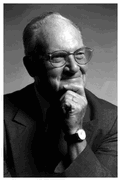 Jewel posts an article about a speech Robert Muller gave recently. Dr. Muller is the former assistant secretary general of the United Nations, now Chancellor emeritus of the University of Peace in Costa Rica. A splendid man I've enjoyed meeting and listening to in the past. He has been very instrumental over the years in many U.N. activities, such as the Conference on the Human Environment in 1972. He is basically the guy who for the first time thought of calling the environment "The Environment". There wasn't a term for it before. Anyway, Muller now has a surprising and delightful take on recent events. Jewel posts an article about a speech Robert Muller gave recently. Dr. Muller is the former assistant secretary general of the United Nations, now Chancellor emeritus of the University of Peace in Costa Rica. A splendid man I've enjoyed meeting and listening to in the past. He has been very instrumental over the years in many U.N. activities, such as the Conference on the Human Environment in 1972. He is basically the guy who for the first time thought of calling the environment "The Environment". There wasn't a term for it before. Anyway, Muller now has a surprising and delightful take on recent events."I'm so honoured to be here," he said. "I'm so honoured to be alive at such a miraculous time in history. I'm so moved by what's going on in our world today."
(I was shocked. I thought -- Where has he been? What has he been reading? Has he seen the newspapers? Is he senile? Has he lost it? What is he talking about?)
Dr. Muller proceeded to say, "Never before in the history of the world has there been a global, visible, public, viable, open dialogue and conversation about the very legitimacy of war."
The whole world is in now having this critical and historic dialogue--listening to all kinds of points of view and positions about going to war or not going to war. In a huge global public conversation the world is asking -- "Is war legitimate? Is it illegitimate? Is there enough evidence to warrant an attack? Is there not enough evidence to warrant an attack?
What will be the consequences? The costs? What will happen after a war? How will this set off other conflicts? What might be peaceful alternatives? What kind of negotiations are we not thinking of? What are the real intentions for declaring war?"
All of this, he noted, is taking place in the context of the United Nations Security Council, the body that was established in 1949 for exactly this purpose. He pointed out that it has taken us more than fifty years to realise that function, the real function of the U.N. And at this moment in history--the United Nations is at the centre of the stage. It is the place where these conversations are happening, and it has become in these last months and weeks, the most powerful governing body on earth, the most powerful container for the world's effort to wage peace rather than war.
Dr. Muller was almost in tears in recognition of the fulfilment of this dream.
"We are not at war," he kept saying. We, the world community, are WAGING peace. It is difficult, hard work. It is constant and we must not let up. It is working and it is an historic milestone of immense proportions. It has never happened before -- never in human history -- and it is happening now, every day, every hour, waging peace through a global conversation. The article is a synopsis by Lynne Twist of what he said. The full transcripts should appear in a couple of weeks here.
Hm, he's right, really. However tense things have been recently, it has been the tenseness of discussion. With some luck we might look back at this time in the future as the time when everything changed, and it became impossible to start wars unilaterally.
[ Politics | 2003-03-14 23:59 | 0 comments | PermaLink ]
|
|
| Thursday, March 13, 2003 |  |
|
|
|
David Weinberger mentions an article on Human Rights News about a new U.S. law.U.S. President George Bush today signed into law the American Servicemembers Protection Act of 2002, which is intended to intimidate countries that ratify the treaty for the International Criminal Court (ICC). The new law authorizes the use of military force to liberate any American or citizen of a U.S.-allied country being held by the court, which is located in The Hague. This provision, dubbed the "Hague invasion clause," has caused a strong reaction from U.S. allies around the world, particularly in the Netherlands. In addition, the law provides for the withdrawal of U.S. military assistance from countries ratifying the ICC treaty, and restricts U.S. participation in United Nations peacekeeping unless the United States obtains immunity from prosecution. The Hague is obviously located in the Netherlands, and the law pretty much adds up to declaring war on the Netherlands, and on anybody else who supports the International Criminal Court.
[ Politics | 2003-03-13 23:07 | | PermaLink ] More >
|
|
| Monday, March 10, 2003 |  |
|
|
|
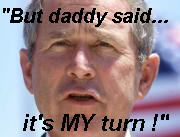 Unbelievable. Even George Bush the elder is apparently taking issue with his son's actions. Read this article about George Bush Sr giving a speech at Tufts University in Massachussetts. Unbelievable. Even George Bush the elder is apparently taking issue with his son's actions. Read this article about George Bush Sr giving a speech at Tufts University in Massachussetts.The first President Bush has told his son that hopes of peace in the Middle East would be ruined if a war with Iraq were not backed by international unity.
Drawing on his own experiences before and after the 1991 Gulf War, Mr Bush Sr said that the brief flowering of hope for Arab-Israeli relations a decade ago would never have happened if America had ignored the will of the United Nations. [...]
The former President’s comments reflect unease among the Bush family and its entourage at the way that George W. Bush is ignoring international opinion and overriding the institutions that his father sought to uphold. Mr Bush Sr is a former US Ambassador to the UN and comes from a family steeped in multi-lateralist traditions. Let me say it again. However many faults the previous U.S. presidents have had, they've largely acted coolly and presidentally in their foreign policies, even if they didn't in their personal lives. Bush Jr. is more like a regular dysfunctional guy, a spoiled rich kid, coke-head, dry drunk, mood swinging, vengeful, angry, learning about the world by sitting in his underwear watching TV, and acting as if he somehow won the whole thing in the lottery.
[ Politics | 2003-03-10 22:13 | | PermaLink ] More >
|
|
| Sunday, March 9, 2003 |  |
|
|
|
Sorry about all the war stuff, but it is encouraging that there is an increasing amount of excellent coverage in the mainstream U.S. media. Like a couple of Op-Ed pieces in the New York Times, such as Saying No to War:"Given the corner Mr. Bush has painted himself in, withdrawing troops — even if a considerable slice remains behind — would be an admission of failure. He obviously intends to go ahead, and bet on the very good chance that the Iraqi army will fall quickly. The fact that the United Nations might be irreparably weakened would not much bother his conservative political base at home, nor would the outcry abroad. But in the long run, this country needs a strong international body to keep the peace and defuse tension in a dozen different potential crisis points around the world. It needs the support of its allies, particularly embattled states like Pakistan, to fight the war on terror. And it needs to demonstrate by example that there are certain rules that everybody has to follow, one of the most important of which is that you do not invade another country for any but the most compelling of reasons. When the purpose is fuzzy, or based on questionable propositions, it's time to stop and look for other, less extreme means to achieve your goals." and The Xanax Cowboy:"Bush officials believe that making the world more scared of us is the best way to make us safer and less scared. So they want a spectacular show of American invincibility to make the wicked and the wayward think twice before crossing us.
Of course, our plan to sack Saddam has not cowed the North Koreans and Iranians, who are scrambling to get nukes to cow us.
It still confuses many Americans that, in a world full of vicious slimeballs, we're about to bomb one that didn't attack us on 9/11 (like Osama); that isn't intercepting our planes (like North Korea); that isn't financing Al Qaeda (like Saudi Arabia); that isn't home to Osama and his lieutenants (like Pakistan); that isn't a host body for terrorists (like Iran, Lebanon and Syria).
I think the president is genuinely obsessed with protecting Americans and believes that smoking Saddam will reduce the chances of Islamic terrorists' snatching catastrophic weapons. That is why no cost — shattering the U.N., NATO, the European alliance, Tony Blair's career and the U.S. budget — is too high."
[ Politics | 2003-03-09 17:46 | | PermaLink ] More >
|
|
|
|
 Another item in a long list of fake evidence and proof synthesized from newspaper articles, used to justify war. From Washington Post: Another item in a long list of fake evidence and proof synthesized from newspaper articles, used to justify war. From Washington Post:A key piece of evidence linking Iraq to a nuclear weapons program appears to have been fabricated, the United Nations' chief nuclear inspector said yesterday in a report that called into question U.S. and British claims about Iraq's secret nuclear ambitions.
Documents that purportedly showed Iraqi officials shopping for uranium in Africa two years ago were deemed "not authentic" after careful scrutiny by U.N. and independent experts, Mohamed ElBaradei, director general of the International Atomic Energy Agency (IAEA), told the U.N. Security Council. And we're also talking about those aluminum tubes, which Colin Powell says are for use in enriching uranium for nuclear weapons. Doesn't match with the facts, as they aren't suited for that purpose, and it is well documented how Iraq is using them to make ordinary rockets.
[ Politics | 2003-03-09 13:46 | | PermaLink ] More >
|
|
|
|
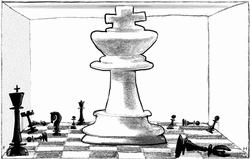 Nice article from Jimmy Carter in the New York Times. (A brief registration is required to access it). Carter is a good man and an intelligent man - somebody worthy of running a country. These days, like Clinton, he's somewhat breaking the unwritten rule for ex-presidents, of not commenting on or critisizing the current administration. But the U.S. has never had an administration like this one, so apparently willing to pour it all down the drain. Nice article from Jimmy Carter in the New York Times. (A brief registration is required to access it). Carter is a good man and an intelligent man - somebody worthy of running a country. These days, like Clinton, he's somewhat breaking the unwritten rule for ex-presidents, of not commenting on or critisizing the current administration. But the U.S. has never had an administration like this one, so apparently willing to pour it all down the drain."Profound changes have been taking place in American foreign policy, reversing consistent bipartisan commitments that for more than two centuries have earned our nation greatness. These commitments have been predicated on basic religious principles, respect for international law, and alliances that resulted in wise decisions and mutual restraint. Our apparent determination to launch a war against Iraq, without international support, is a violation of these premises." He goes on to explain criteria for having a "just" war.- The war can be waged only as a last resort, with all nonviolent options exhausted.
- The war's weapons must discriminate between combatants and noncombatants.
- Its violence must be proportional to the injury we have suffered.
- The attackers must have legitimate authority sanctioned by the society they profess to represent.
- The peace it establishes must be a clear improvement over what exists.
And he points out clearly how Bush's war is something totally different from what has happened in the past. The choice of initiating military action is something past American presidents have sweated over, that has kept them up at night, discussing all the possibilities, making sure it is the best thing to do. Despite their flaws, they have always been people with integrity and restraint. But now war appears to be something you plan in advance, and then you go and try to sell people on it, by making up reasons if necessary.
[ Politics | 2003-03-09 13:29 | | PermaLink ] More >
|
|
| Thursday, March 6, 2003 |  |
|
|
|
John Robb mentions an article "The Pentagon's New Map" by Thomas Barnett, a military strategist from the U.S. Naval War College. It purportedly explains "why we're going to war, and why we'll keep going to war". But what is interesting about it is that it is based on a fairly lucid analysis of how it is *disconnection* that gives birth to the dangers of terrorism and rogue states, etc. Which I fully agree with. It is the fact that some nations and some groups of people are disconnected from the rest of us, that is likely to lead to them feeling disadvantaged and resentful, to the degree that they're likely to strike back. If we were all intertwined in a unified globalized structure, in terms of economics, communication, technology, democracy, etc., there would be no basis for war. So that would be the target.
So far so good. But to a hammer everything is a nail. To Mr. Barnett, being a military strategist, the means of getting there is by going to war. That begins to sound rather insane. Achieve a unified, open, prosperous, global democracy by going to war against anybody who isn't going along with the globalization thing. But I wouldn't be too surprised if that is actually the strategy the people who're running Bush are pursuing. Bomb any country that doesn't have McDonalds franchises. It has hardly anything to do with whether those countries are a military threat to the United States. It has all to do with whether they're willing to play by our rules or not. Which involves giving multi-national corporations free reign, and refraining from acting as an independent state. There's a certain twisted logic there.
[ Politics | 2003-03-06 23:59 | | PermaLink ] More >
|
|
| Wednesday, March 5, 2003 |  |
|
|
|
It is a good idea not to forget how the last gulf war was started. Yes, Iraq invaded Kuwait, but I think a lot of people are not aware that the United States quite directly and officially had let Saddam Hussein know that he was welcome to have his way with Kuwait. In other words, it was a trap. Read more about it, and read the transcript of what the U.S. ambassador actually said.Eight days before the outbreak of the Gulf war, Saddam summoned April Glaspie, then the American ambassador to Iraq, and launched into a tirade. He railed about the pernicious role of the British in the region, reminded her that without Iraq the Iranians would not be stopped from taking over the whole region by anything short of nuclear weapons, and complained about the "economic aggression" of Kuwait and the United Arab Emirates in agitating for lower oil prices. He made it all too clear that he intended to use force to stop what he claimed were Kuwaiti incursions onto Iraqi territory in the so-called Neutral Zone. Glaspie replied that the Americans, too, had experience with "the colonialists," which indeed seems odd given that the US and these very "colonialists" would be jointly bombing the hell out of Iraq is a little over a week's time. As for the price of oil, Ms. Glaspie opined that "We have many Americans who would like to see the price go above $25 because they come from oil-producing states." At a time when the US secretary of state was none other than James Baker, a Texan who virtually personifies Big Oil, the implications of what the US Ambassador was telling Saddam were inescapable. Glaspie went on to say:
"I think I understand this. I have lived here for years. I admire your extraordinary efforts to rebuild your country. I know you need funds. We understand that and our opinion is that you should have the opportunity to rebuild your country. But we have no opinion on the Arab-Arab conflicts, like your border disagreement with Kuwait. I was in the American Embassy in Kuwait during the late 60's. The instruction we had during this period was that we should express no opinion on this issue and that the issue is not associated with America. James Baker has directed our official spokesmen to emphasize this instruction. We hope you can solve this problem using any suitable methods . . ."
[ Politics | 2003-03-05 15:16 | | PermaLink ] More >
|
|
|
|
Britt Blaser posts some well-balanced thoughts about empowered dialogue in regards to war or no war."In the fall of 1967, I was flying C-130s in Viet Nam and my fiancée was marching for peace in Washington. We didn't see that as a conflict—more like covering both sides of the story. Nor did we feel any tension around this. I was there because I was expected to be there, and, having been born in 1942, I had grown up with the expectation of military service. She marched because our generation was working out a new voice and that view had to be sent to the politicians." Indeed, it is not as simple as a for or against, and that everybody is just one or the other. It is vital to examine all sides. Preferably to step into the shoes of all sides. Personally I'm not even particularly a pacifist, in the sense of refusing all uses of violence. Sometimes it is the best solution to kill people. If you threaten me and my family enough with physical harm, and I don't see any other solution, I'd kill you too. But violence and death is a very real and serious matter. The people you kill will be dead. The people you didn't quite succeed in killing, or that were just accidentally standing too close to the action, they will be messed up. They'll have missing body parts, and they'll have lost people they loved. Their husbands and wives and children and parents. It is very ugly. It isn't just something you can decide remotely, to make a political statement. Anyway, Britt is somebody who's experienced war first hand, who's been shot at, shot down in a plane, who's pals have been killed, so I certainly pay attention to his angles on this. Anyway, one of the main points Britt is making here, which could lead to uncomfortable conclusions is along the lines of:"If we don't occupy Iraq now, the body count goes up—not because that's where the terrorists are, but because we will not have been forceful enough to do so and silence the Arab machismo affect." The idea being that there are terrorists out there. They'll kill people if they can get away with it. But it is more like a street fight than a war. But that it is necessary to send a signal of strength, or the other parties will exploit our weakness. Hm, I can see that, but at the same time I don't agree. I think that the people we're dealing with, in the Middle East, and the groups we're concerned with as sources of terrorism, I think they certainly respect strength. They might be likely to respect displays of power more than they respect talk. But at the same time they feel morally obliged to revenge and pay back injustices believed to be carried out against their people, whatever definition they have of what 'their' people are, or of what injustices are. I think that's the motivation. It isn't just because they can, and nobody's stopping them. Violence that in any way can be regarded as unjust will tend to foster more payback violence, in the form of terrorism. But strength itself doesn't necessarily create that backlash. I think the Arab machismo is a big factor, but I think the worst you can do about it is to humble it. The trick is to display unarguable strength, but not to force your opponents to lose face. If you do, they will be morally obliged to use their very last breath to try to regain their pride.
The whole thing has been handled badly in terms of diplomacy from the U.S. side. It is set up so that Bush, and his pal Blair, would lose face if they don't get their war. Because they've spent a lot of energy on talking about how they're going to bomb Iraq no matter what. So, of course, if they're forced to back down, it looks a bit stupid, and they look weak. They've played their cards very badly diplomatically. It could very well have been a useful thing to send all those soldiers and all that hardware down there to stand and look very threatening. It could have been done in a way where it would have been a victory if war didn't become necessary. Right now it would look like a loss of face, even if Hussein spontaneously disappeared altogether.
I don't think the lack of a war now would in any way increase the likelyhood of something worse happening later. On the contrary. What makes this war almost inavoidable is only the unwillingness of the side of the current U.S. administration to look weak, or to be caught being wrong. It is about proving that one is right by proceeding with the original plan, even though it was greatly bungled.
[ Politics | 2003-03-05 13:51 | | PermaLink ] More >
|
|
| Tuesday, March 4, 2003 |  |
|
|
|
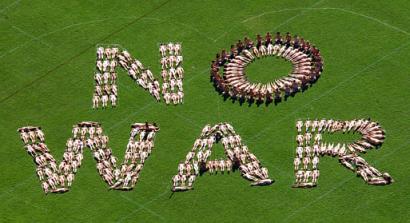
300 Australian women staging a war protest, by spelling out "No War" with their naked bodies in a Sydney sports field.
[ Politics | 2003-03-04 21:08 | | PermaLink ] More >
|
|
| Monday, March 3, 2003 |  |
|
|
|
Rebecca Blood quotes some wise excerpts from the Federalist Papers. The founding fathers of the United States foresaw many potential pitfalls in the system they were designing. Just a shame that their design has gradually become less and less respected and adhered to by successive U.S. governments.Federalist No. 4, John Jay:
"[T]he safety of the people of America against dangers from foreign force depends not only on their forbearing to give just causes of war to other nations, but also on their placing and continuing themselves in such a situation as not to invite hostility or insult; for it need not be observed that there are pretended as well as just causes for war.
It is too true, however disgraceful it may be to human nature, that nations in general will make war whenever they have a prospect of getting anything by it; [rulers] will often make war when their nations are to get nothing by it, but for purposes and objects merely personal, such as a thirst for military glory, revenge for personal affronts, ambition, or private compacts to aggrandise and support their particular families or partisans. These and a variety of other motives, which affect only the mind of the sovereign, often lead him to engage in wars not sanctified by justice or the voice and interests of his people."
[ Politics | 2003-03-03 23:59 | | PermaLink ] More >
|
|
| Sunday, March 2, 2003 |  |
|
|
|
Well, no reason to insult Americans in general, but this map seems to roughly indicate the level of Bush's foreign policy.
[ Politics | 2003-03-02 23:59 | | PermaLink ] More >

|
|
|
|
An article in The Observer has caused quite a stir. It reveals NSA plans for surveillance, including intercepting phone calls and e-mails, of UN delegates in New York. Of course the delegates from the countries that are likely to not agree with the U.S. position. The Observer had at first posted an e-mail purported to be from a top NSA official, but which used British spelling and date format. They still insist that it is authentic, but that they at first had 'translated' it for a British audience, and now they changed it back. That's a bit fishy, of course. I'd like to see the real message with its headers. Regardless, I'm sure that something like that is going on.
[ Politics | 2003-03-02 23:59 | | PermaLink ] More >
|
|
|
|
Mentioned on Greater Democracy and other places, this site, "Caught on Film", lists many real-life examples of George Bush saying one thing and doing something very different at the same time. Amongst regular folks, that's called 'lying'. Example:
What Bush said:
"I said when I was running for President, I supported ethanol, and I meant it. (Applause.) I support it now, because not only do I know it's important for the ag sector of our economy, it's an important part of making sure we become less reliant on foreign sources of energy." – Bush at South Dakota Ethanol Plant 4/24/02
What actually happened:
According to the AP, Bush’s 2004 budget proposes to eliminate funding for the bioenergy program that funds the Dakota Ethanol Plant he visited. [4/22/02]
[ Politics | 2003-03-02 23:59 | | PermaLink ] More >
|
|
| Saturday, March 1, 2003 |  |
|
|
|
Career diplomat John Brady Kiesling has sent his letter of resignation to Secretary of State Colin Powell. It is well worth reading, as this is a person of integrity who's speaking the truth."The sacrifice of global interests to domestic politics and to bureaucratic self-interest is nothing new, and it is certainly not a uniquely American problem. Still, we have not seen such systematic distortion of intelligence, such systematic manipulation of American opinion, since the war in Vietnam. The September 11 tragedy left us stronger than before, rallying around us a vast international coalition to cooperate for the first time in a systematic way against the threat of terrorism. But rather than take credit for those successes and build on them, this Administration has chosen to make terrorism a domestic political tool, enlisting a scattered and largely defeated Al Qaeda as its bureaucratic ally. We spread disproportionate terror and confusion in the public mind, arbitrarily linking the unrelated problems of terrorism and Iraq. The result, and perhaps the motive, is to justify a vast misallocation of shrinking public wealth to the military and to weaken the safeguards that protect American citizens from the heavy hand of government. September 11 did not do as much damage to the fabric of American society as we seem determined to so to ourselves. Is the Russia of the late Romanovs really our model, a selfish, superstitious empire thrashing toward self-destruction in the name of a doomed status quo?"
[ Politics | 2003-03-01 23:59 | | PermaLink ] More >
|
|
<< Newer stories Page: 1 2 3 4 5 6 7 8 9 Older stories >> |

